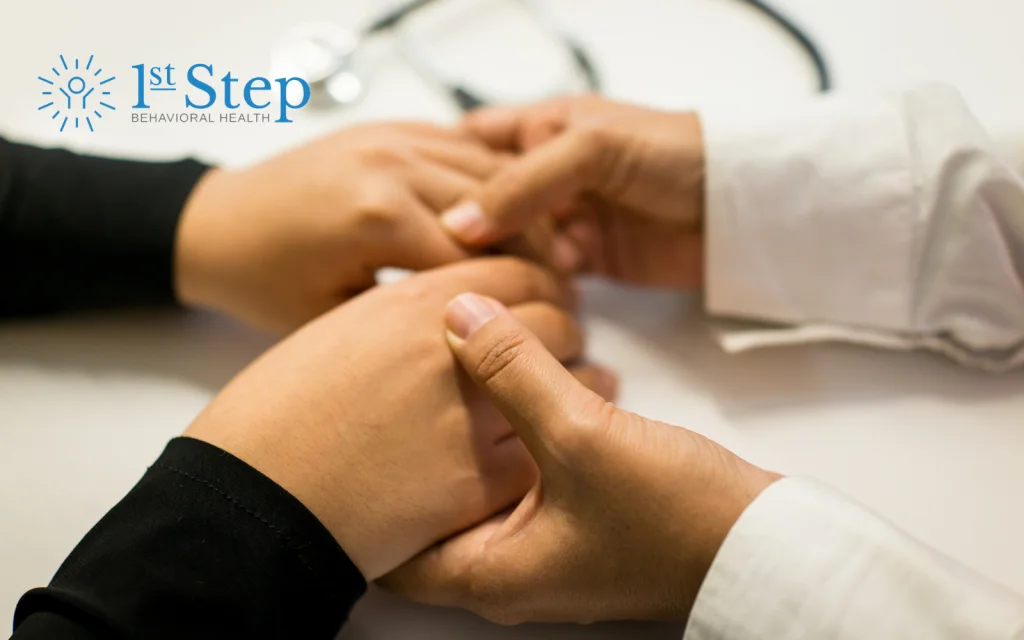Living with post-traumatic stress disorder (PTSD) and addiction can be challenging. Comprehensive treatment can help people manage their symptoms, restore functioning, and avoid relapse.
This article will detail what to expect in treatment for PTSD and addiction. You will also learn how to find effective, compassionate treatment for these conditions.
Reach out to the First Step Behavioral Health team now to explore our PTSD and addiction treatment programs. Our intake staff can help you find the right type of care and schedule an intake assessment. Take the first step of your recovery journey by contacting us today.
What is PTSD?
Post-traumatic stress disorder (PTSD) is a mental health condition that can develop after someone experiences a traumatic event. Research from the National Center for PTSD shows that about 8% of people in the United States will develop PTSD in their lifetime.[1]
Some common causes of PTSD include:
- Physical or sexual assault
- Car accidents
- Surviving a natural disaster
- Military combat
People with PTSD may develop symptoms immediately after the event long after it occurs. According to the Diagnostic and Statistical Manual of Mental Disorders (DSM), the symptoms of PTSD include:[2]
- Mood changes or angry outbursts
- Difficulty sleeping
- Poor concentration
- Feeling emotionally “numb”
- Avoiding people, places, or activities that remind them of the traumatic event
- Experiencing flashbacks of the trauma
- Nightmares
Untreated PTSD can reduce your quality of life and make it difficult to function. People who develop PTSD are 14 times more likely to develop a substance use disorder (SUD).[3]
Trauma-focused therapy and other treatment options can help people with PTSD and addiction manage their symptoms. They can help people have a better quality of life.
Exploring the Therapies Used to Treat PTSD
If you or a loved one lives with post-traumatic stress disorder, there are effective treatments that can help you feel and function better. Here is an overview of some treatments for PTSD.
Medications
Taking prescription medications can help you reduce PTSD symptoms. Medication management for PTSD includes selective serotonin reuptake inhibitors (SSRIs) like Sertraline (Zoloft), Paroxetine (Paxil), and Venlafaxine (Effexor).[4]
Cognitive behavioral therapy (CBT)
Cognitive behavioral therapy focuses on helping people identify the relationships between their thoughts, emotions, and behaviors. People learn to change destructive patterns, which can lead to healthier behaviors.
Eye movement desensitization and reprocessing (EMDR)
EMDR is a form of therapy that uses a series of specific eye movements to process “stuck” traumatic memories. Some mental health professionals believe that these memories may cause anxiety, depression, and other symptoms. EMDR is thought to reduce the negative emotions associated with these memories.[5]
Support groups
People who live with PTSD may feel isolated or lonely. Support groups can help people with PTSD connect with peers and learn from others’ experiences.
Recognizing Addiction
People living with PTSD are more likely to develop substance abuse than people without the condition. Addiction can cause short and long-term harm. Recognizing addiction can help you get the help you need to recover.
Some signs of addiction include:
- Spending a lot of time and energy getting, using, and recovering from using drugs or alcohol
- Neglecting your responsibilities, hobbies, or relationships because of substance use
- Needing to use more drugs or alcohol to get the desired effects
- Isolating yourself or only spending time with others who use drugs and alcohol
- Experiencing withdrawal symptoms if you stop using drugs or alcohol
- Having legal or financial problems associated with your substance use
- Experiencing new or worsening mental health symptoms
- Wanting to stop using drugs or alcohol but finding that it is challenging to quit on your own
Addiction can develop quickly, or it can occur slowly over time. Repeated substance use can change how your body and brain work. These changes can make it very difficult to stop using drugs and alcohol, even when they cause significant harm.
Treatment for PTSD and Addiction
Treatment for PTSD and addiction is available in several levels of care. Many people start their recovery in an inpatient rehab program and then transition into outpatient care later. The level of care you require depends on the severity of your addiction and mental health needs.
Here is an overview of what to expect during treatment for PTSD and addiction.
Assessment
A doctor or addiction specialist will ask questions about your substance use, mental health, family history, and more. This information will allow your team to create a tailored treatment plan to meet your needs.
Detox
During detox, medical and mental health professionals will monitor your withdrawal symptoms. They will provide treatment as needed. Your treatment plan may include:
- Medications to reduce cravings and other withdrawal symptoms
- Emotional support
- Mental health care
- Round-the-clock access to treatment and support
- A safe, secure environment
Comprehensive detox treatment can help you stay safe and comfortable during the detox process.
Treatment
After completing detox, you will begin a PTSD and addiction treatment program. Your treatment plan may include:
- Medications
- Cognitive behavioral therapy (CBT) and other behavioral therapies
- Group therapy
- Family therapy
- Relapse prevention education
- Mental health treatment
- Coping skills
- Exercise, nutrition support, mindfulness, and other holistic therapies
- Aftercare planning
Your treatment plan will help you manage your PTSD symptoms and address the underlying causes of your substance use.
Find Treatment for PTSD and Addiction Now
If you or someone you love lives with PTSD and addiction, you are not alone. Effective, evidence-based treatment is available at First Step Behavioral Health. Contact us now to explore your treatment options.
Sources:
- National Center for PTSD: How Common is PTSD in Adults?
- National Institutes of Health (NIH): DSM-5 Diagnostic Criteria for PTSD
- National Institutes of Health (NIH): Posttraumatic Stress Disorder and Co-Occurring Substance Use Disorders: Advances in Assessment and Treatment
- National Center for PTSD: Medications for PTSD
- National Center for PTSD: Eye Movement Desensitization and Reprocessing (EMDR) for PTSD

